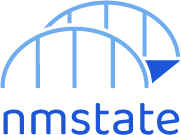A declarative network management API for hosts.
Copr build status, all repos are built for Fedora Linux and RHEL/CentOS Stream/EPEL 8+:
Nmstate is a library with an accompanying command line tool that manages host networking settings in a declarative manner. The networking state is described by a pre-defined schema. Reporting of current state and changes to it (desired state) both conform to the schema.
Nmstate is aimed to satisfy enterprise needs to manage host networking through a northbound declarative API and multi provider support on the southbound. NetworkManager acts as the main (and currently the only) provider supported.
Nmstate provides:
- Rust crate -- nmstate
- Command line tools --
cargo install nmstatectl - Python library --
libnmstate - Go binding
- C binding
More document could be found at nmstate.io
Desired/Current state example (YAML):
---
dns:
config:
server:
- 192.0.2.1
search:
- example.org
routes:
config:
- destination: 0.0.0.0/0
next-hop-interface: eth1
next-hop-address: 192.0.2.1
interfaces:
- name: eth1
type: ethernet
description: Main-NIC
state: up
ipv4:
enabled: true
dhcp: false
address:
- ip: 192.0.2.9
prefix-length: 24
ipv6:
enabled: falseNmstate GitHub Issues pages for discussion.
You may find us in #nmstate on Libera IRC also.
Yay! We are happy to accept new contributors to the Nmstate project. Please follow these instructions to contribute.
For Fedora 29+, sudo dnf install nmstate.
For other distribution, please see the install guide.
- libnmstate API
- Code examples
- State examples
- nmstatectl user guide
- nmstatectl man page:
man nmstatectl
Please refer to CHANGELOG





